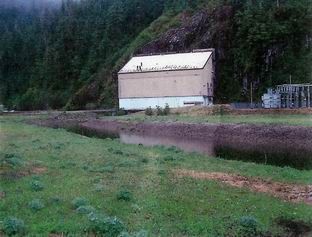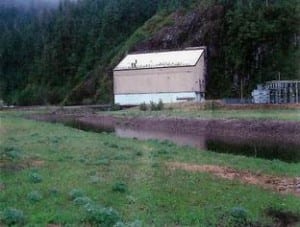Officials are looking into ways to streamline operations and administration of two publicly-owned hydro-electric power plants in Southeast Alaska. The changes could mean staff reductions and other cost savings at the Swan Lake and Tyee Lake power plants that provide electricity to Petersburg, Wrangell and Ketchikan.
Audio PlayerFor iFriendly audio, click here
The Southeast Alaska Power Agency, or SEAPA, owns two hydro power plants at Swan Lake and Tyee Lake and provide electricity to the three communities. SEAPA has agreements with two different entities to operate the power plants – Ketchikan Public Utilities for Swan Lake and Thomas Bay Power Authority for Tyee Lake. Oversight of the electricity involves several elected and appointed bodies in the three Southeast communities, with some of the same people serving on more than one of those groups.
Former SEAPA CEO Dave Carlson presented a history of the projects and the organization at a meeting of the SEAPA board in Petersburg this month. He said the structure of the public entities was not a good example of streamlined government. “To pass the operating budgets, to pass the operating budgets for Swan and Tyee, it takes 33 people,” Carlson said. “You gotta get the Thomas Bay Power Commission, seven, and the Wrangell and Petersburg, City and borough or Wrangell, seven more, city of Petersburg, seven more, city of Ketchikan, seven more. Then you got the SEAPA board who really has, I mean the SEAPA board is the one that really has to approve the budgets.”
Carlson said costs for operations and maintenance have been rising since the board removed a 600-thousand dollar labor cost cap in 2009. In recent years, the combined cost of operating the two plants has been around one and a half million dollars. Carlson pointed out there are some costs that SEAPA covers for Thomas Bay and not for KPU.
The SEAPA board commissioned a study of the organizational structure. John Heberling of the consulting firm D. Hittle and Associates said his company saw some opportunities for cost savings. “Our folks who looked at this felt that the amount of work that needs to be done at the projects could be done with fewer people,” Heberling said And there is potential for some savings in there along the standpoint of labor costs.”
Heberling recommended changing to one contracting entity for both projects, instead of two. He said, with a reduction of four staff, SEAPA could see savings of nearly a half million dollars annually. He said another benefit of a single contractor would be employees at the power plants could train to work at both sites and move back and forth between Swan and Tyee lakes. “We also think that a more transparent bottom-up budget process would be helpful from the standpoint of both projects rather than have a single contractor or have a contractor come in and say well this is what the costs are,” Heberling said.
Several board members didn’t actually think SEAPA’s costs were too high or unexpected. Robert Larson of Petersburg thought the increases were reasonable. “My perception of this table is we’re doing a pretty darn good job constraining our growth in the O and M costs,” Larson said.
For some board members, the main issue was not staff reductions. Member Charlie Freeman of Ketchikan urged the rest of the board to take action and begin a several year process to change to a single contractor. “I don’t want us to get too bogged down in cost savings or personnel issues here,” Freeman said. “To me the main and primary issue is we’re not the boss. We don’t have direct or adequate control over our own destiny here as far as SEAPA’s concerned. We got too many fingers in the pie.”
The organizational structure was also a concern for board chair Jeremy Maxand of Wrangell. “The real issue is how are we managing these projects together to get the best deal for the rate payers in all our communities,” Maxand said. “And right now the way these two projects are managed is very dysfunctional. And there’s a lot of tension and conflict and misunderstanding about chains of command.”
While board members agreed they needed to look at changes, some asked about keeping both TBPA and KPU as operators, and negotiating amendments to the existing agreements with those contractors. Most board members said they were not ready to vote on the issue this month and wanted to get input from the three communities before deciding.
Changes to the operating agreements and structure of the organizations will take several years of work and would not likely happen before 2014 at the earliest.
Representatives with KPU and TBPA were both at the SEAPA meeting and provided input on the discussion. Following the meeting, Thomas Bay Power Authority general manager Paul Southland said it was premature to comment on the SEAPA study. “This report was released to the public at 9 a.m. this Monday and frankly at least I haven’t had an opportunity to digest it in whole. I know that some of the facts presented could be questioned, I’ll have to go back and review those. I know it will have significant impact on the communities of Wrangell and Petersburg and what exactly those impacts are we’ll have to analyze,” Southland said.
The SEAPA board unanimously approved a motion to defer a decision on starting the reorganization process until the board’s next meeting in December. That’ll give the board members and staff time to get feedback on the change from the three communities.












